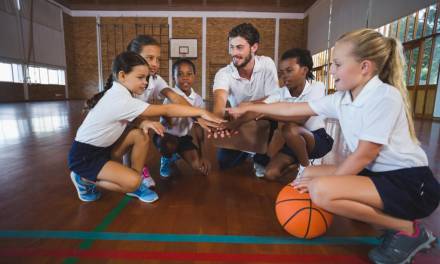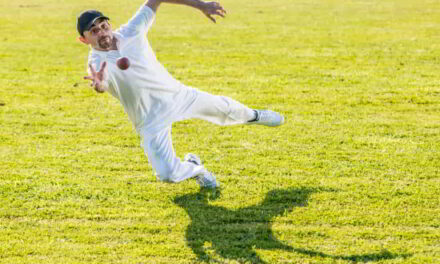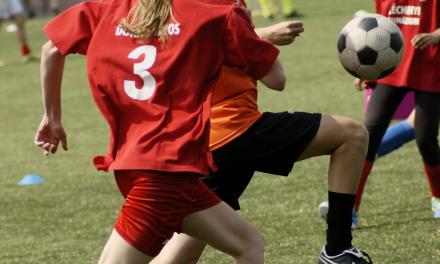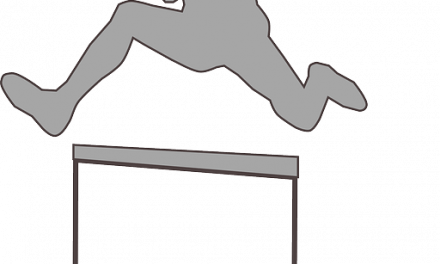Obesity, technology, evolving curriculums, ever tighter school budgets – they’re all influencing and impacting the role of the PE teacher.
Make no mistake – the role of the PE teacher seems set to change beyond recognition. But what should be expected of this 22nd century PE teacher? Let’s explore a range of expert opinions…
Prepare for a move to (even more) theoretical work
Three years ago, a Guardian article drew on the expert opinions of PE teachers to share their insight into the future of PE, and how PE teachers may need to change in order to adapt to the future challenges of schools and their children.
The opinions were wide, diverse and, at times, alarming – case and point made by the thought below, which predicts that GCSE PE could become even less physical than it is already (despite our society facing an obesity crisis).
Changes to the GCSE specification, which mean PE is now made up of 70% theory and 30% practical work, could have damaging consequences. Teachers may be under more pressure in the next decade to teach theory content from an earlier age, limiting practical work. GCSE PE becoming academic like other subjects could prevent more physically able and talented pupils from choosing the subject
Rather than viewing PE as a way to encourage exercise from a young age and imbue the concept of lifelong fitness into our children, it is now increasingly being seen as just another subject to take with the same kind of targets and exams as other subjects.
Does this mean that we are losing the essence of joyful participation in sporting activities in order to add another tick box to Ofsted reports?
The future PE teacher must be a specialist (even in primary schools)
Despite a lack of funding, resources and dedicated PE teachers in primary schools, there is a hope that specialist PE teachers will eventually be funded properly in the primary schools sector.
Just like private schools, my hope is that within the next 10 years every school will have a primary PE specialist. The sport premium [money designed to help primary schools improve the quality of PE] is a good start but it needs to be there for good to enable head teachers to plan by introducing the official role of PE teacher in primary schools
The realities of government funding restrictions and falling teacher numbers may not see this happen in the short to medium term though. Primary schools will continue to rely on teachers covering PE as part of their responsibilities or will have to share a specialist PE teacher amongst a group of schools.
Exceptional networking
In a paper exploring the changing role of the PE teacher, the argument that they should work as networkers with the wider community was advanced (something that had previously been explored by many preceding studies).
Not only could this extended role overcome some of the challenges of tighter budgets (leading to connections with local sports grounds and fellow schools with complementary equipment and premises), but it could also involve PE teachers working with other departments more seamlessly.
PE teachers often make strong leaders – a trait that can be successfully leveraged to create long-lasting relationships with local sports clubs and generate community support for extra-curricular activities.
Covering paths of progression for lesser known sports
Anyone for Tchoukball? Or Rhythmic Gymnastics? Perhaps a quick game of Ultimate Frisbee?
A number of new sports have been parachuted into the school curriculum without any thought of exit strategies. Students get the opportunity to sample new sports and develop basic core skills but then have nowhere to continue their development as there are no local clubs
Should a PE teacher also be responsible for supporting all sports as extra-curricular activities? It’s all well and good to expect them to support as many sports as possible during lessons but how can students be expected to follow up on their love of a particular sport if there are no opportunities to participate outside of school.
Again, PE teachers can become the liaison to NGOs and local clubs but with so little financial support, how can this be managed effectively? Maybe parents can be encouraged to set up local clubs for ‘minor’ sports that interest their children.
The gatekeeper to future health and well-being
Despite a war against it, the obesity battle is being lost. This can mean only one thing for PE teachers – that their role will face more pressure to guide students in the management of their health and wellbeing.
This will demand a continuing focus on health and fitness being a life skill, with lessons that look to the far longer term than just the football pitch for 90 minutes. Yet whilst this will be unsurprising to many, one element of health and wellness that future PE teachers must involve, is an increasing focus on mental wellbeing.
At my school we have been trying to reach students through cross-curricular PSHE and PE lessons to teach them about healthy eating and stress-relieving techniques and mentally healthy than just going for a run or playing in a team every so often










